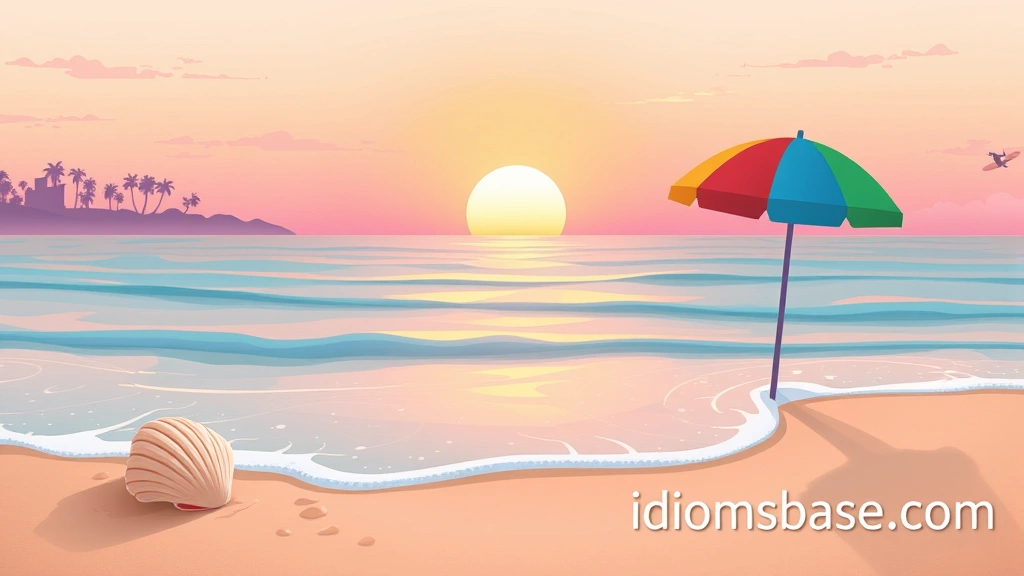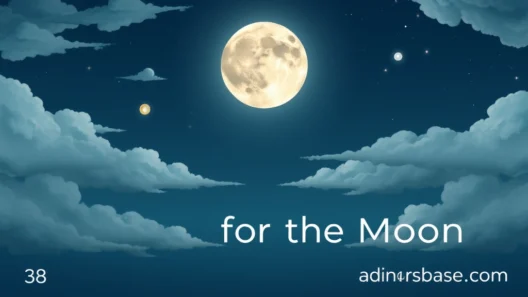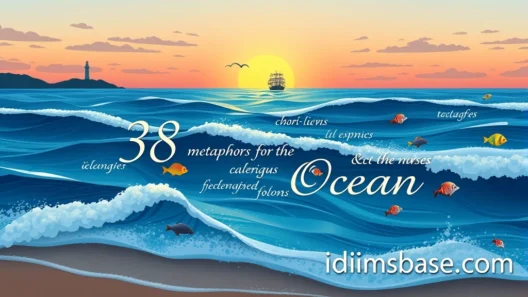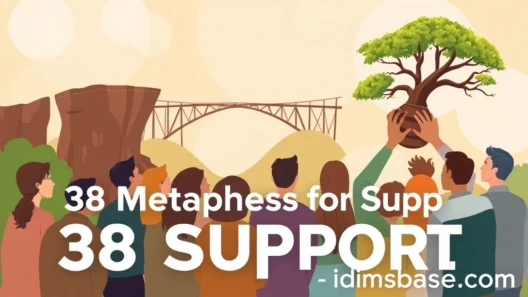Ever felt the calming embrace of the ocean, or the warm sand between your toes, and thought, "Wow, that's just like…"? You're not alone! The beach, with its endless horizons, rhythmic waves, and vibrant life, is a treasure trove of inspiration. It's a place that speaks to our souls, offering a perfect canvas for metaphors.
Metaphors are like little word-wizards, helping us paint vivid pictures and connect ideas in fresh, exciting ways. They deepen our understanding and add a splash of color to our language. So, whether you're a writer looking for that perfect phrase, a speaker aiming to captivate your audience, or just someone who loves the magic of words, you're about to dive into a sea of creativity! Let's explore 38 incredible metaphors for the beach that will truly make your descriptions sing.
38 Metaphors for the Beach
Get ready to see the beach in a whole new light! From its calming influence to its wild energy, these metaphors capture every facet.
The Beach as a Canvas
The beach often feels like a blank slate, ready for nature's artistry or our own creative expressions.
- A blank canvas: Imagine the sand, smooth and waiting for the tide to paint new patterns or for you to leave your footprints.
- Nature's easel: Here, the sky and sea are the paint, and the horizon is the masterpiece.
- A sculptor's studio: The wind and waves are constantly reshaping the dunes, creating new forms.
- A living gallery: Each sunset paints a new, breathtaking scene onto the ocean's expanse.
- A giant sandbox: Just like a child's play area, but on an epic scale, inviting endless exploration.
The Beach as a Healer or Sanctuary
There's something inherently therapeutic about the beach. It's a place to unwind, reflect, and find peace.
- A therapist's couch: The rhythmic waves can lull you into a state of calm, helping worries drift away.
- A comforting embrace: The warm sand and gentle breeze feel like a hug from nature itself.
- A soul's balm: It soothes anxieties and brings a sense of inner peace.
- A whisper of peace: The soft sounds of the ocean invite tranquility.
- A cleansing ritual: The ocean washes away stress, leaving you refreshed and renewed.
The Beach as a Stage or Arena
Sometimes, the beach feels like a grand performance, or a place where epic events unfold.
- A grand auditorium: The crashing waves are the applause, and the horizon is the backdrop for dramatic skies.
- A bustling marketplace: Full of life, sounds, and constant activity, especially on a busy day.
- A timeless amphitheater: Where the drama of tides and weather plays out endlessly.
- A natural runway: For seabirds taking flight or waves making their grand entrance.
- A wrestling match: The waves constantly battle the shore, a dynamic struggle.
The Beach as a Journey or Portal

The beach often represents beginnings, endings, or a gateway to new experiences.
- A threshold to the unknown: Beyond the horizon lies endless mystery and adventure.
- A starting line: For a new day, a new thought, or a new journey.
- A gateway to serenity: Step onto the sand and feel the calm wash over you.
- A winding path: Each step along the shore reveals new treasures and perspectives.
- A bridge to eternity: The immense expanse connects you to something vast and everlasting.
The Beach as a Living Entity
The beach isn't just a place; it often feels alive, breathing, and experiencing.
- The earth's heartbeat: The rhythmic ebb and flow of the tides mimic a steady pulse.
- A whispering giant: The wind and waves tell ancient stories.
- A hungry mouth: The ocean constantly devours and reshapes the shore.
- A vast lung: Inhaling and exhaling with the tides, breathing life into the landscape.
- A watchful eye: The horizon gazing out, seemingly observing everything.
The Beach as a Metaphor for Life
Many aspects of the beach mirror the complexities and beauty of life itself.

- Life's ebb and flow: Just like the tides, life has its ups and downs, its comings and goings.
- A book of endless chapters: Every wave, every shell, every sunset tells a new story.
- A mirror to the soul: It reflects our deepest thoughts and emotions.
- A lesson in impermanence: Nothing stays the same; the sand shifts, the waves change.
- A testament to resilience: The shore withstands endless pounding waves, always remaining.
Unique and Playful Metaphors
Let's get a little more imaginative and quirky with these!
- A giant comb: The waves comb through the sand, leaving patterns behind.
- A natural treadmill: Perfect for a long, meditative walk.
- A memory keeper: Each grain of sand seems to hold a memory of sun-drenched days.
- A natural alarm clock: The rising sun and sounds of gulls signaling a new day.
- A giant sand timer: The shifting sands marking the passage of time.
- A cosmic dance floor: Where the elements perform their eternal ballet.
- A whisper network: The sea breeze carrying secrets and stories along the coast.
- A nature's lullaby: The soothing sound of waves helping you drift off to sleep.
Key Takeaways
- Metaphors enrich language: They help us describe the beach in vivid, imaginative ways.
- The beach is multi-faceted: It can be seen as a canvas, a healer, a stage, a journey, a living entity, or even a reflection of life itself.
- Creativity is key: Don't be afraid to invent your own unique metaphors!
- Connect emotionally: The best metaphors evoke feelings and create a stronger connection with the reader.
Frequently Asked Questions (FAQs)

Q1: What is a metaphor?
A metaphor is a figure of speech that directly compares two unlike things without using "like" or "as." It states that one thing is another, even though it's not literally true, to create a deeper meaning or vivid image. For example, "The beach is a therapist's couch."
Q2: Why are metaphors important in writing?
Metaphors make writing more engaging, evocative, and memorable. They help readers visualize concepts, understand complex ideas, and feel a stronger emotional connection to the subject matter. They add depth and richness to your descriptions.
Q3: How can I use these beach metaphors in my own writing?
You can use them in poetry, prose, song lyrics, speeches, marketing copy, or even casual conversation! Think about the specific feeling or idea you want to convey about the beach, then choose the metaphor that best captures it. Don't be afraid to adapt them or combine ideas.
Q4: Can I create my own metaphors for the beach?
Absolutely! In fact, we encourage it. The best metaphors often come from personal observation and unique insights. Spend time at the beach, engage your senses, and think about what it reminds you of. What does it feel like? What does it do?
Q5: What's the difference between a metaphor and a simile?
The main difference is the use of "like" or "as." A simile compares two things using "like" or "as" (e.g., "The sand was like sugar"). A metaphor directly states that one thing is another (e.g., "The sand is sugar"). Both are powerful tools for description!
Q6: Are there any common pitfalls when using metaphors?
Yes, a few! Avoid clichés (overused metaphors), mixed metaphors (combining incompatible metaphors), and metaphors that are too obscure or confusing for your audience. The goal is clarity and impact, not just cleverness.
So, the next time you find yourself gazing at the vast expanse of the ocean or feeling the cool sand beneath your feet, remember these metaphors. Let them inspire you to see the beach not just as a place, but as a source of endless wonder, a reflection of life, and a canvas for your imagination. What new metaphors will you discover? The beach is waiting for your story!






